| Feb-28-07 | | SBC: Tim Harding stated that Pillsbury, the American champion, won a prize for this game vs the Italian champion, Arturo Reggio during the 1902 Monte Carlo tournament. Does anyone know what prize this might have been? |
|
| Apr-21-07 | | ath: Jacques Pope's biography of Pillsbury (Ann Arbor, 1996, p. 157) suggests that the MacCutcheon prize (500 francs) was awarded to Pillsbury for the Pillsbury-Marshall game (round 21). |
|
| Apr-22-07 | | whiteshark: 1 price, 1 winner, 2 games, 2 sources
Hmmm...
If you look at
Pillsbury vs Marshall, 1902, Marshall blundered a piece away, whereas in this game Pillsbury win it during an attack. <SBC> Why don't you ask Tim Harding directly ? |
|
| Apr-22-07 | | ath: Let's tweak those numbers a bit further:
Digging further into contemporary sources, I find a notice in Deutsche Schachzeitung, October, 1902 (p. 321), that there seem to have been two MacCutcheon prizes at 500 francs. The one for the best defense was awarded to Mason for his game against Gunsberg. The one for the best attack was awarded Pillsbury for his game against Marshall. |
|
Apr-04-22
 | | jnpope: Ok, best guess is Harding's source was either the Brooklyn Daily Eagle, 6 July 1902, or a source that used the report from the BDE. Helms definitely states Pillsbury won the McCutcheon prize for his game against Reggio (a statement he corrects the following week). So there was no prize awarded to Pillsbury for his game against Reggio. Monte Carlo (1902) (kibitz #46) |
|
Jan-08-23
 | | An Englishman: Good Evening: If I had served as judge, would have picked this game over the Marshall. Although Reggio was not the same class as Marshall, Pillsbury's combination of attacks on both wings in this game looks more impressive and better serves as an example of his imaginative and vigorous style. |
|
Jan-09-23
 | | jnpope: <All the awards in the late Monte Carlo chess tournament have been announced with the exception of the two prizes offered by J. L. McCutcheon, of Pittsburg, Pa., for the best games in that tourney illustrating the attack and defense of his opening. […]
To give this line of defense the supreme test, as he supposed, Mr. McCutcheon offered two prizes of one hundred dollars each—one for the best played win by the first player, and the other for the similarly best win scored by the defense. Mr. Reichhelm was appointed umpire to make the awards and four games were presented in the line of competition, namely, two won by the attack, Pillsbury against both Marshall and Reggio, and two won by the defense, Gunsberg from Mortimer and Albin from Reggio. [...]
To take into consideration the attacking wins first it is at once obvious that Mr. Pillsbury is the only claimant, and his win against Mr. Marshall is the finest illustration of the McCutcheon opening that was played at Monte Carlo. It cannot be said, however, that the interesting variation was played in its integrity, for while Pillsbury’s play was all right Marshall missed the vitally excellent move for the defense at turn ten (namely, Q to R4), and therefore the true value of the innovation still remains to be determined.>
Source: Philadelphia <North American>, 1902.06.08
Stockfish has Reggio making four mistakes to Pillsbury's single mistake, whereas in the Marshall game Pillsbury makes no mistakes and Marshall has two. I guess Reichhelm opted to go with the Pillsbury win that was error free on White's part (or less overall mistakes?). |
|
Jan-13-23
 | | KEG: A standard Pillsbury crush against a weak opponent. Pillsbury has fighting to overtake Maroczy for first place (he ultimately just fell short), and Reggio was in 19th place out of 20 where he would remain. Pillsbury played an ultra-aggressive line against the MacCutcheon. His 10. b4?! was--objectively--of doubtful soundness, but he rightly surmised that Reggio would lose his way in the resulting complications. After Reggio's poor 15...Bd7? and 18...Na5?, the rest of the game was little more than target practice for Pillsbury. 1. e4 e6
2. d4 d5
3. Nc3 Nf6
4. Bg5 Bb4
The MacCutcheon, though theoretically sound, was a risky line to pursue against to tactically-accomplished an adversary as Pillsbury. 5. e5 h6
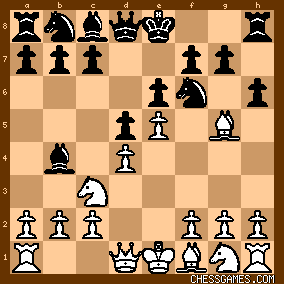
click for larger view6. Bh4
"?"--(Sergeant/Watts)
A minority choice, but very much in Pillsbury's style. He drew with this move in an 1899 game against Showalter, and then successfully employed it against Marshall in the final round of this tournament. Most usual here is 6. Bd2. Other good choices are 6. exN and 6. Be3. While the text is not theoretically best, it hardly warrants the "?" assigned to it by Sergeant/Watts in their book on Pillsbury. Pillsbury must have known 6. Bh4 would lead to complications and was likely happy to take this route. 6... g5
7. Bg3 Ne4
8. Nge2
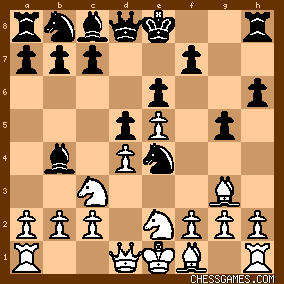
click for larger view8... c5
8...h5 and 8...f5 are the crucial moves in this line. But Reggio, like Marshall later, tried the sharp text. 9. a3

click for larger view9... Ba5
As Sergeant/Watts correctly stated, 9...BxN+ [the move played by Marshall against Pillsbury in their final round game] was much better (as was 9...NxN), though the suggestion of Sergeant/Watts after 9...BxN+ 10. NxN of 10...f5? is bizarre and probably losing (10...Qa5 or 10...NxN would yield a sharp game with all sorts of chances for both sides. After the text, White emerges with the slightly better chances with 10. dxc5. but Pillsbury--true to form--selected the wildest line: 10. b4?!

click for larger viewSpeaking purely objectively, the text was far from best and creates dangers for White. My guess is that Pillsbury knew all this but correctly surmised that Reggio would quickly go astray, as he did. 10... NxN
Not a blunder, but 10...NxB (11. hxN cxb4 12. Nb5 Nc6) looks like the best way to attempt to refute Pillsbury's 10th move. 11. NxN cxb4
12. Nb5

click for larger viewA scary and complicated position to try to play against the likes of Pillsbury. As Pillsbury may have expected, Reggio began to go wrong here, and was completely busted a few moves later. |
|
Jan-14-23
 | | KEG: Post II
Sergeant/Watts speculated that Pillsbury's 12. Nb5 (to which they assigned a "!") was probably a surprise to Reggio. His play certainly seemed befuddled from this point: 12... Bxa3+?
12...b3+ is the critical line. After the text Pillsbury had surmounted his problems and soon went for the kill. 13. c3 Bc7?
Reggio might have tried to anticipate the coming attack with 13...Kf8. Now Pillsbury went to work:
14. h4!
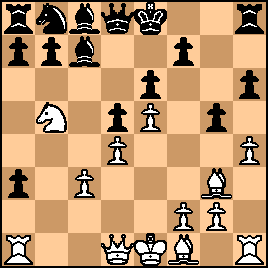
click for larger view14... a6?
More weak play by Reggio. The only chance to offer resistance lay in 14...Rg8 or maybe 14...Rf8. Reggio apparently did not notice that his a-pawn was about to get pinned. 15. Rxa3
Even stronger was 15. Qa4! But the text also left Reggio tied up in knots: 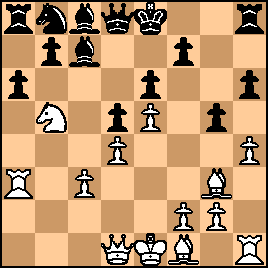
click for larger view15... Bd7?
Reggio was probably lost already, but the text made matters even more hopeless. To have any even practical prospects of weathering the storm, he had to try 15...Rf8 pr 15. Rg8. After the text, Pillsbury got a raging attack on both wings: 16. NxB+ QxN
17. hxg5 Nc6
18. gxh6

click for larger view18... Na5?
Removing the Knight from the defense was little short of suicide. But even some "better" moves that come to mind had little likelihood of saving the day. 19. Qc1
"!"--(Sergeant/Watts)
Strong, but stronger still would have been 19. Bh4! 19... Bb5
20. Bh4
"To stop [Black] castling on the Queen-side." (Sergeant/Watts) 20... BxB
21. KxB
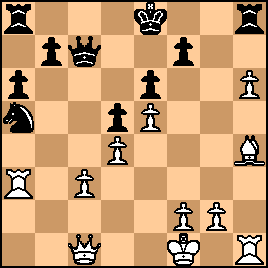
click for larger view |
|
Jan-14-23
 | | KEG: Post III
The game was now essentially over, and Pillsbury from here just made sure he didn't blow it and apparently did not wrack his brains to find the fastest lines: 21... Nb3
21...Nc4 or 21...Kd7 might have allowed Reggio to hand around a little longer. 22. Qg5
With all sorts of murderous threats.
22... Qc4+
23. Kg1 Kd7
24. Qe7+ Kc6
25. Rh3

click for larger view25... Rh7
This site and the Tournament Book give this as the move played. Sergeant/Watts give 25...Rhe8. Given Pillsbury's crushing bind on the position, the difference is of little matter. In what follows, I will assume that this site and the Tournament Book got it right. 26. Qd6+
26. RxN was quicker, but Pillsbury's line was also absolutely convincing. 26... Kb5
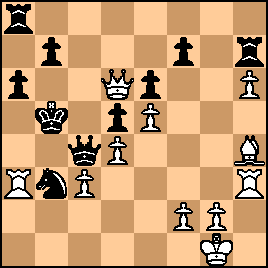
click for larger view27. Qd7+
27. Bd8 was faster, but once again it hardly matters. 27... Kb6
28. Ra4
28. Be7 was equally deadly.
28... Qc6

click for larger viewPillsbury now won the Black Knight and forced resignation: 29. Rb4+ Ka7
30. QxQ bxQ
31. RxN
Game over:
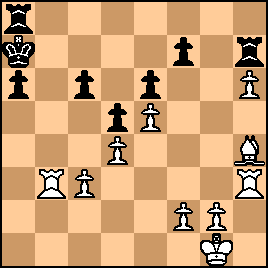
click for larger view31... Rxh6
32. Be7
1-0
With both mate and loss of a Black Rook threatened, Reggio could only have extended the game with 32...Rah8. But then 33. RxR RxR 34. Bc5+ Ka8 35. Rb6 would leave Black down a Rook and a pawn (either the a-pawn or the c-pawn must fall) with no reason to play on. |
|
|
|
|





